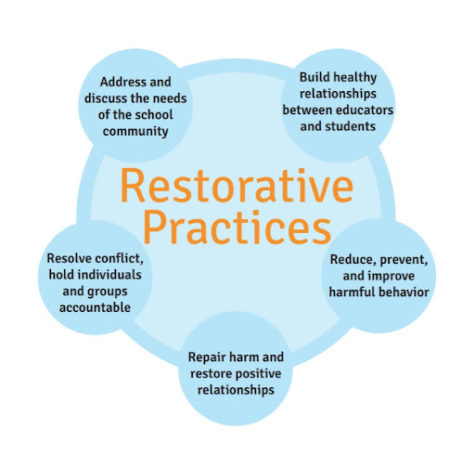Confronting and preventing violence with JTHS’ Restorative Practices
October 27, 2021

As a so-called dark cloud hangs over Joliet West and Joliet Central amid an apparent uprising in violence at the schools, the Joliet Township High School (JTHS) Restorative Practices Problem Solving Circle Program put in place in 2012 has become a subject in question for its methods.
Also referred to as Restorative Justice, Restorative Practices Programs are established to consider alternatives to standard punishment procedures. According to Implementing Restorative Justice: A Guide for Schools, Restorative Justice is a “philosophy based on a set of principles that guide the response to conflict and harm.” The U.S. Department of Education defines it as “a set of informal and formal strategies intended to build relationships and a sense of community to prevent conflict and wrongdoing, and respond to wrongdoings, with the intention to repair any harm that was a result of the wrongdoing.”
By the means of Public Act 99-0456 (Senate Bill 100), as of September of 2016, the Illinois School Code requires that schools resort to pertinent alternative disciplinary interventions before students are recommended for suspension or expulsion.
Problem Solving Circles (PSC), or social-emotional circles, are an aspect of Restorative Justice at JTHS. The affected student and a family member gather with others in a circle to discuss the reason for their being there and prioritize getting to the roots of the problem through a weekly series of one-hour sessions. Circles consist of a circle facilitator, a setting, a talking piece, and shared agreements. According to JTHS, they can “provide students with the opportunity to earn their way off Expulsion Warning.”
On Friday, May 21, 2021, JTHS’ Problem Solving Circle Team was awarded the Distinguished Service Award by the Illinois National School Public Relations Association. The program was put in place to reduce expulsion rate and provide a sense of community for students to encourage reflection and growth.
After videos of school fights were shared with WJOL’s Scott Slocum, he was quick to address the concerns of parents and community members. He questioned what the discipline policy was to alleviate the increase in violence. He also received and read an anonymous letter from a JTHS staff member that not only expressed their concern about the “dishonest, underhanded, corrupt dealings going on in this district,” but the failings of Restorative Justice. After reading the letter aloud, Slocum claimed, “It’s not effective…you had 70 people suspended in the first three-and-a-half weeks of school, why did it take your principal getting beat up for you to stop the sham that is Restorative Justice?”
In response to the claims made by Slocum and the anonymous letter, district superintendent Dr. Karla Guseman went on WJOL’s podcast to clear up, “I have no knowledge of any dishonesty or manipulation of data.” She also stated, “The other narrative out there is that we’re done with Restorative Practices…we’re not, because Restorative Practices isn’t instead of consequences, it’s support along consequences.”
Special Education Math Instructor at West Jeremy Kreiger explained that Restorative Practices “were never intended to diminish accountability, expectations, or repercussions for undesired or inappropriate behavior.” He followed with, “Rather, restorative practices rely on the relationship piece to provide a safe container for meaningful conversations once misbehavior, disagreement, or harm has been done regardless of the infraction or occurrence.”
Though Kreiger explained that consequences would be returning to a “stricter nature of increased suspensions, expulsion warnings, and outright exclusionary measures due to the things that are happening in our school buildings.”
JTHS facilitator focused on climate and culture in schools Sarah-Bess Dworin described that “in schools across the country, everyone is seeing, unfortunately, a terrible spike in not only physical violence but suicidality, anxiety, depression…there is no question the degree to which the pandemic has impacted teens’ mental health.” Dworin added that “when we communicate messages that people who don’t conform to a particular standard don’t belong, those individuals feel that social exclusion and behave in all kinds of ways.” She furthered, “I also believe that individuals are not defined by the worst mistake that they make and that people are so much bigger and more holistic than impulsive actions they take.”
Dworin also communicated that “when we try to bring Restorative Justice into a school, it’s actually about centering the needs of the individuals who were harmed, rather than focusing on the harm-doers exclusively.”
Joliet West sophomore and PSC participant Emily Aguirre shared her thoughts on her experiences with the program, writing, “[Problem Solving Circles] have helped me step by step to learn how to be better from my mistakes…I recommend students like me who have made negative choices to do this program to help better themselves.”
PSC Coordinator at West Dean Thompson expressed that he thinks Problem Solving Circles are “one of the best interventions that the district has to offer when it comes to our students- that small percent of our students- that need help or have a challenge of making decisions that are conducive to their growth and development as opposed to things that are gonna hurt that.” Thompson mentioned that it is important to have a “less punitive” approach to consequences, rather than not punitive at all. He clarified, “There’s a delicate balance that needs to take place because we’re people, we need boundaries.”
While the hallway fights have lessened since the exposure on the news, the district is now focusing their efforts to get students to class on time. Through a message sent out to parents and students on Thursday, Oct. 21, 2021, JTHS explained new tardy policies including hall sweeps, and using communication to figure out the “root cause of the tardy” to be able to recognize patterns and recommend necessary “student support services.” One potential “consequence” will be Problem Solving Circles facilitated by the newly established MTSS teams, otherwise known as a multi-tiered system of supports.

